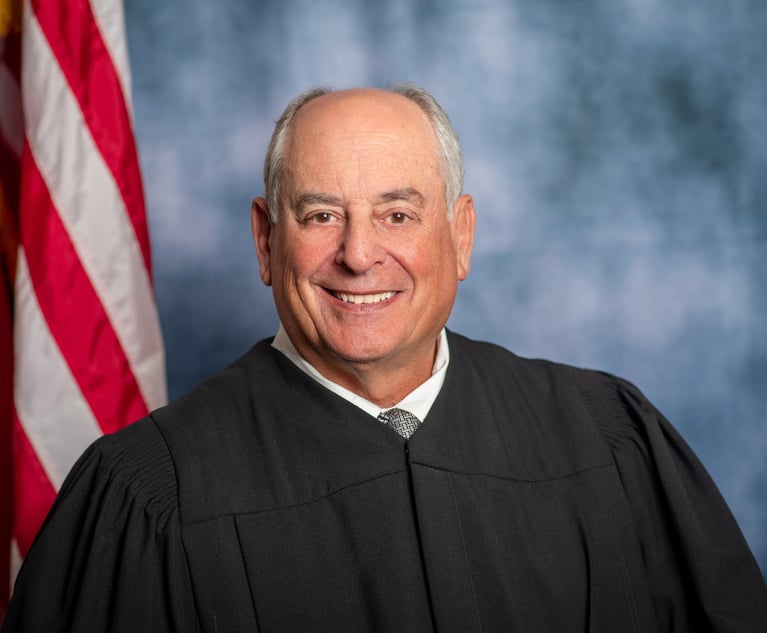 Jeffrey Golomb of Gomez & Golomb (Courtesy photo)
Jeffrey Golomb of Gomez & Golomb (Courtesy photo)Appeals Court Revives Suit Against Sheriff Over Ex-Deputy Who Shot Man
The Court of Appeals said the Fulton County sheriff and three staffers are not immune from claims that they allowed a deputy with a history of disciplinary problems to retire, which led to him landing a security guard job where he shot a man during an argument.
June 28, 2019 at 04:34 PM
7 minute read
The Georgia Court of Appeals revived claims against the Fulton County sheriff and four staff members accused of allowing a deputy with a lengthy disciplinary record to retire instead of being fired, allowing him to get a job as a security guard where he shot and paralyzed a man.
A Fulton County judge threw the case out last year, ruling that Sheriff Ted Jackson and three co-defendants were protected by official immunity and that there was no way they could have foretold that ex-Deputy Michael Carroll would shoot Alexander Ray after leaving the department.
The appellate panel disagreed, reversing on both the official immunity and foreseeability issues.
“I actually thought it was a pretty easy decision,” said Ray's lawyer, Gomez & Golomb partner Jeffrey Golomb.
He said he had not yet spoken to his client about the ruling when contacted Thursday.
“He was just a 25-year-old kid who had his life turned upside down,” he said. “He was shot and paralyzed from the waist down and ended up staying with his parents.”
The case is being defended by Fulton County Law Department attorney Michelle Arrington, and County Attorney Patrise Perkins-Hooker said she could not comment on the pending litigation.
According to Golomb and court filings, Carroll started working as a Fulton deputy in 1987.
Beginning in 1990, Carroll racked up at least 28 disciplinary violations ranging from habitual tardiness and falsifying his time sheets to lying on a polygraph test. There were also allegations that he beat up a suspect, was suspected of stealing a suspect's property, cursed and threatened another officer and was cited for driving on a suspended license.
He also had his car and gun stolen and, in one case, Union City police “had a high-speed chase with a man selling drugs from Carroll's car,” according to personnel records cited in the complaint. “Carroll reported that he loaned the man the car after doing a background check for outstanding warrants.”
In 2010, Carroll was placed under investigation for “conduct unbecoming” and “fraud, falsehood, perjury and malfeasance.” In 2011, he “retired in lieu of dismissal,” which was reported to the Police Officer Standards and Training Council.
“'Retired in lieu of dismissal' is a term of art used by the POST Council,” the complaint said. “The other types of separation used by the POST Council are: voluntary resignation, retirement, layoff, dismissal, suspension, and demotion.”
A few days before he left, Carroll asked the department's records administrator to assist in “updating my personnel file to reflect my retirement date,” and she issued him a “to whom it may concern letter” saying he had retired effective April 12, 2011.
“Predictably, Mr. Carroll used the April 12, 2011, letter from the Fulton County Sheriff's Personnel Office to apply for employment as an armed security officer,” said the complaint.
He was hired as a round-the-clock security officer at the Daron Village Apartments in northwest Atlanta, where he was provided an apartment.
“Carroll was living with a woman my guy was having a relationship with,” Golomb said.
Ray was visiting the woman at the apartment in 2013 when he and Carroll got into an argument and Carroll shot him.
Carroll was arrested and charged with felony assault and battery and possession of a firearm during the commission of a felony.
Golomb sued the apartments and Carroll in 2014; that case settled in 2017, and Golomb said he could not discuss its terms.
In March 2018, he filed a personal injury suit against Fulton County, Jackson, Col. Jimmy Butts, Chief Deputy Jimmy Carter and records clerk Mildred Jackson in Fulton County State Court.
The complaint said the one-year statute of limitations for filing an ante litem notice to the county did not apply, because Carroll's charges remained pending at the time, and asserted claims against the sheriff and staffers in their individual capacities.
Golomb later dismissed the claims against the county and Jackson in his official capacity, conceding that they were barred by sovereign immunity.
According to the office of District Attorney Paul Howard, the criminal charges against Carroll were dismissed in April 2018 after an investigation and witness indicated that Ray was the “initial aggressor.”
The county moved to dismiss the rest of Ray's claims and, in September, Judge Myra Dixon did so, ruling that the defendants were protected by official immunity.
“Under the doctrine of official immunity, a public official is not liable for his negligent performance of a discretionary act within the scope of his authority,” wrote Dixon. “However, he may be personally liable if he negligently performs a ministerial act or acts with actual malice or intention to injure while performing a discretionary act.
“The determination of whether an official function is discretionary or ministerial is a matter for the court,” she wrote.
Ray claimed that the sheriff was negligent in issuing the retirement letter to Carroll but “did not demonstrate what specific ministerial duty Sheriff Jackson, in his individual capacity, performed or what policies and procedures [he] violated.”
The other defendants, the judge found, “acted only within the scope of their discretionary authority when dealing with personnel issues. It is not reasonable that defendants would foresee that a former employee of the Fulton County Sheriff's Office would injury (sic) plaintiff two years after his employment with the FCSO ended.”
The June 24 Court of Appeals opinion written by Judge E. Trenton Brown III, with the concurrence of Judges Anne Elizabeth Barnes and Amanda Mercier, said Dixon should have allowed the case to go to discovery before ruling whether the defendants were entitled to official immunity.
Carroll had “indisputably retired in lieu of dismissal” before shooting Ray, Brown said, and the retirement letter was part of his application for the security job.
“Discovery could conceivably reveal clear and specific procedures that were violated by the individual defendants” when the letter was written, he said, “and presumably provided to Carroll for his use in obtaining future employment.”
He also agreed with Ray that the trial judge erred in concluding that Ray's “injuries could not have been foreseen by the defendants as a matter of law.”
“Ray's complaint alleges numerous disciplinary incidents that could conceivably put the individual defendants on notice that Carroll would use the … letter to find work as a security guard and harm someone,” the opinion said.
Therefore, it said, a jury question exists with regard to proximate cause.
Golomb said the dismissal of Carroll's criminal charges would have no bearing on the case when it goes back to Dixon.
“It would have been great if Carroll had pled or been found guilty, but the real relevance of the criminal charges is they tolled the deadline to submit an ante litem notice,” he said.
The main issue “remains whether the recommendation letter was a breach of a ministerial duty by the defendants involved,” said Golomb. “I don't think self-defense, in and of itself, is going to get Fulton off the hook.”
This content has been archived. It is available through our partners, LexisNexis® and Bloomberg Law.
To view this content, please continue to their sites.
Not a Lexis Subscriber?
Subscribe Now
Not a Bloomberg Law Subscriber?
Subscribe Now
NOT FOR REPRINT
© 2024 ALM Global, LLC, All Rights Reserved. Request academic re-use from www.copyright.com. All other uses, submit a request to [email protected]. For more information visit Asset & Logo Licensing.
You Might Like
View All
Georgia Supreme Court Honoring Troutman Pepper Partner, Former Chief Justice
2 minute read
'A 58-Year-Old Engine That Needs an Overhaul': Judge Wants Traffic Law Amended
3 minute read
Appeals Court Removes Fulton DA From Georgia Election Case Against Trump, Others
6 minute read
Family of 'Cop City' Activist Killed by Ga. Troopers Files Federal Lawsuit
5 minute readTrending Stories
- 1'Largest Retail Data Breach in History'? Hot Topic and Affiliated Brands Sued for Alleged Failure to Prevent Data Breach Linked to Snowflake Software
- 2Former President of New York State Bar, and the New York Bar Foundation, Dies As He Entered 70th Year as Attorney
- 3Legal Advocates in Uproar Upon Release of Footage Showing CO's Beat Black Inmate Before His Death
- 4Longtime Baker & Hostetler Partner, Former White House Counsel David Rivkin Dies at 68
- 5Court System Seeks Public Comment on E-Filing for Annual Report
Who Got The Work
Michael G. Bongiorno, Andrew Scott Dulberg and Elizabeth E. Driscoll from Wilmer Cutler Pickering Hale and Dorr have stepped in to represent Symbotic Inc., an A.I.-enabled technology platform that focuses on increasing supply chain efficiency, and other defendants in a pending shareholder derivative lawsuit. The case, filed Oct. 2 in Massachusetts District Court by the Brown Law Firm on behalf of Stephen Austen, accuses certain officers and directors of misleading investors in regard to Symbotic's potential for margin growth by failing to disclose that the company was not equipped to timely deploy its systems or manage expenses through project delays. The case, assigned to U.S. District Judge Nathaniel M. Gorton, is 1:24-cv-12522, Austen v. Cohen et al.
Who Got The Work
Edmund Polubinski and Marie Killmond of Davis Polk & Wardwell have entered appearances for data platform software development company MongoDB and other defendants in a pending shareholder derivative lawsuit. The action, filed Oct. 7 in New York Southern District Court by the Brown Law Firm, accuses the company's directors and/or officers of falsely expressing confidence in the company’s restructuring of its sales incentive plan and downplaying the severity of decreases in its upfront commitments. The case is 1:24-cv-07594, Roy v. Ittycheria et al.
Who Got The Work
Amy O. Bruchs and Kurt F. Ellison of Michael Best & Friedrich have entered appearances for Epic Systems Corp. in a pending employment discrimination lawsuit. The suit was filed Sept. 7 in Wisconsin Western District Court by Levine Eisberner LLC and Siri & Glimstad on behalf of a project manager who claims that he was wrongfully terminated after applying for a religious exemption to the defendant's COVID-19 vaccine mandate. The case, assigned to U.S. Magistrate Judge Anita Marie Boor, is 3:24-cv-00630, Secker, Nathan v. Epic Systems Corporation.
Who Got The Work
David X. Sullivan, Thomas J. Finn and Gregory A. Hall from McCarter & English have entered appearances for Sunrun Installation Services in a pending civil rights lawsuit. The complaint was filed Sept. 4 in Connecticut District Court by attorney Robert M. Berke on behalf of former employee George Edward Steins, who was arrested and charged with employing an unregistered home improvement salesperson. The complaint alleges that had Sunrun informed the Connecticut Department of Consumer Protection that the plaintiff's employment had ended in 2017 and that he no longer held Sunrun's home improvement contractor license, he would not have been hit with charges, which were dismissed in May 2024. The case, assigned to U.S. District Judge Jeffrey A. Meyer, is 3:24-cv-01423, Steins v. Sunrun, Inc. et al.
Who Got The Work
Greenberg Traurig shareholder Joshua L. Raskin has entered an appearance for boohoo.com UK Ltd. in a pending patent infringement lawsuit. The suit, filed Sept. 3 in Texas Eastern District Court by Rozier Hardt McDonough on behalf of Alto Dynamics, asserts five patents related to an online shopping platform. The case, assigned to U.S. District Judge Rodney Gilstrap, is 2:24-cv-00719, Alto Dynamics, LLC v. boohoo.com UK Limited.
Featured Firms
Law Offices of Gary Martin Hays & Associates, P.C.
(470) 294-1674
Law Offices of Mark E. Salomone
(857) 444-6468
Smith & Hassler
(713) 739-1250






